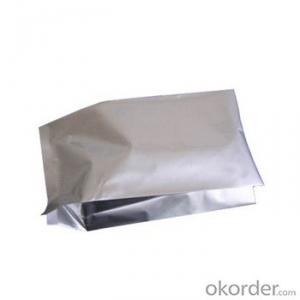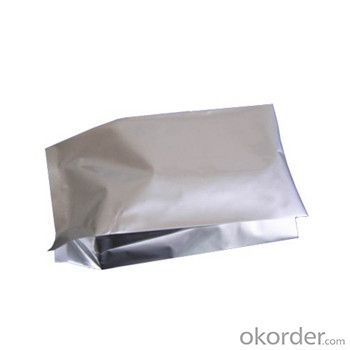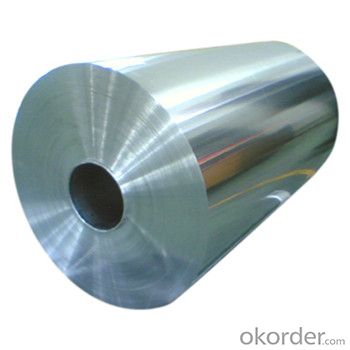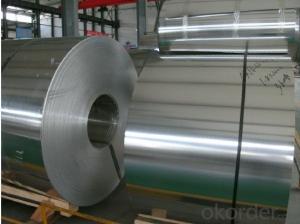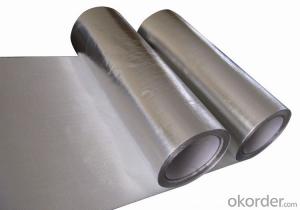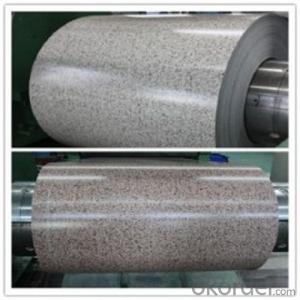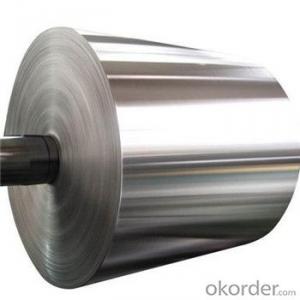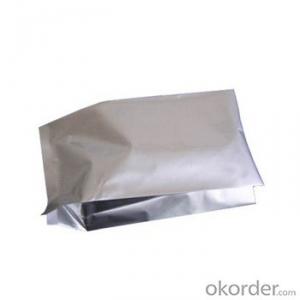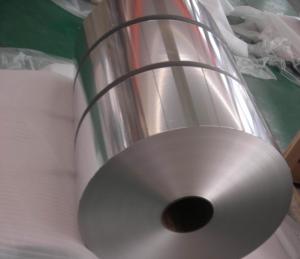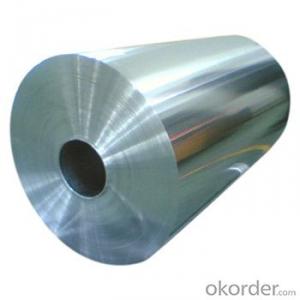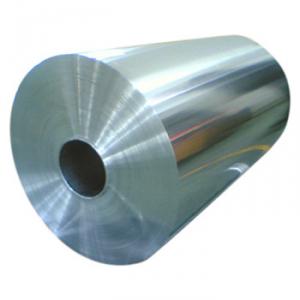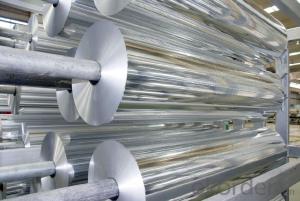Aluminum Coil Anodizing Corp's Aluminium Jumbo Foil for Flexible Packaging Application
- Loading Port:
- China main port
- Payment Terms:
- TT OR LC
- Min Order Qty:
- 3 m.t
- Supply Capability:
- 10000 m.t/month
OKorder Service Pledge
OKorder Financial Service
You Might Also Like
Specification
1. Description of Aluminium Jumbo Foil For Flexible Packaging Application
Aluminum foil aluminum alloy :1235 /8011/8079
Aluminum foil width and length :according to your request
Aluminum foil Core ID :76.2mm &152mm
Aluminum foil temper : o /h12 / h24
Final usage: insulation aluminum foil / lidding aluminum foil /tag and lable aluminum foil / container aluminum foil / food and pharmaceutical packing foil / cigarette aluminum foil
2. Specifications of Aluminium Jumbo Foil For Flexible Packaging Application
Product | Alloy | Thickness | Width | ID mm | Remark |
| Cable wrap foil | 1235/8011-O | 0.2-2.0mm | 60-1700mm | 76 152 200 300 400 500 | Accept customization |
| Bottle cap foil | 8011-H14/H16 | ||||
| Household foil | 1235/8011-O | 0.005-0.2mm | 100-1700mm | ||
| Container foil | 3003-H24/ 8011-H24 | ||||
| Flexible packingfoil | 1100/1235/8011-O | ||||
| Lable foil | 8011-O |
3. Feature of Aluminium Jumbo Foil For Flexible Packaging Application
*Such coil is specially designed to replace aluminum ingot, due to the high export tax of aluminum ingot, the coil has better price than ingot.
*This type of coil can fit customer's remelting furnace just like ingot, no need to make any change to the production line that was previously used for ingot. The standard coil size and weight is very suitable for the feed gate of furnace.
*This type of coil causes less material wastage than ingot when remelted.
*Our coil is made directly from ore, no need to go though the ingot making process, quality is much better than other suppliers who use ingot scrap to make coil.
Be free from Oil Stain, Dent, Inclusion, Scratches, Stain, Oxide Dicoloration, Breaks, Corrosion, Roll Marks, Dirt Streaks and other defect which will interfere with use
4. Certificate:
SGS and ROHS(if client request, paid by client), MTC(plant provided), Certificate of Origin(FORM A, FORM E, CO), Bureau Veritas and SGS (if client request, paid by client), CIQS certificate
5. Image of Aluminium Jumbo Foil For Flexible Packaging Application
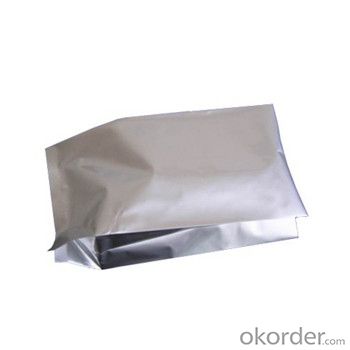
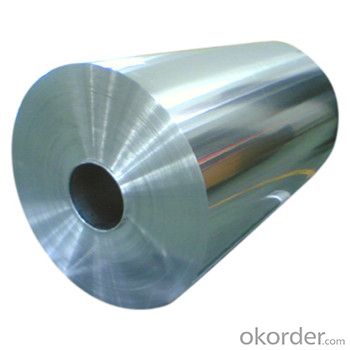
6. Package and shipping of Aluminium Jumbo Foil For Flexible Packaging Application
eye to sky
eye to wall
with wooden pallet (wooden case also available)
7. FAQ
1) What is the delivery time?
Dpends on actual order, around 20 days
2) What is the QC system:
We have QC staff of 20 persons and advanced equipment, each production is with MTC traced from Aluminum ingot lot.
3) What market do you mainly sell to?
Australia, America, Asia, Middle East, Western Europe, Africa etc
- Q: What are the common surface cleaning methods for aluminum coils?
- The common surface cleaning methods for aluminum coils include using a soft cloth or sponge with mild detergent or soap and water to gently scrub the surface. Alternatively, a mixture of vinegar and water can be used to remove stubborn stains. It is important to avoid abrasive cleaners or scrubbing pads that can cause damage to the aluminum surface.
- Q: Can aluminum coils be used for HVAC systems?
- Yes, aluminum coils can be used for HVAC systems. They are commonly used due to their durability, resistance to corrosion, and efficiency in transferring heat.
- Q: What are the environmental effects of utilizing aluminum coil?
- <p>Aluminum coil usage has several environmental impacts. While aluminum is recyclable and has a lower carbon footprint than some other metals, its production requires significant energy, leading to CO2 emissions. The mining and refining processes can also lead to habitat destruction and water pollution. However, its lightweight nature can reduce fuel consumption in transportation, mitigating some environmental effects. The recycling of aluminum saves energy and reduces waste, making it a more sustainable choice over time.</p>
- Q: What is the expected lead time for manufacturing aluminum coils?
- The expected lead time for manufacturing aluminum coils can vary depending on the complexity of the order, the quantity needed, and the production capacity of the manufacturer. Generally, it can range from a few weeks to a couple of months.
- Q: Can aluminum coils be used in outdoor or exposed applications?
- Yes, aluminum coils can be used in outdoor or exposed applications. Aluminum is known for its excellent corrosion resistance, which makes it suitable for outdoor use. It forms a protective oxide layer on the surface that prevents further oxidation. Additionally, aluminum is lightweight, durable, and has a high strength-to-weight ratio, making it a popular choice for outdoor applications where weight and durability are important factors. Aluminum coils are often used in outdoor applications such as HVAC systems, roofing, gutters, and siding, as they can withstand exposure to various weather conditions without compromising their performance or appearance.
- Q: What are the rules and guidelines that govern the transport of aluminum coils?
- <p>Yes, there are specific regulations for the transportation of aluminum coils. These include adhering to weight limits, ensuring proper packaging to prevent damage, and following guidelines for secure loading and unloading. Compliance with hazardous materials regulations is also crucial if the coils are being transported internationally. It's important to check with the specific transportation authority or consult the International Air Transport Association (IATA) and International Maritime Dangerous Goods (IMDG) codes for detailed guidelines.</p>
- Q: Are aluminum coils fire-resistant?
- Yes, aluminum coils are fire-resistant. Aluminum has a high melting point of 660 degrees Celsius (1220 degrees Fahrenheit) and it does not burn, making it a non-combustible material. This property makes aluminum coils suitable for various applications where fire resistance is a critical factor, such as in building construction, electrical wiring, and HVAC systems. Additionally, aluminum's excellent heat conductivity helps dissipate heat quickly, reducing the risk of fire. However, it is important to note that while aluminum coils themselves are fire-resistant, they may be used in systems that include other components which may not have the same level of fire resistance. It is important to consider the entire system and follow proper fire safety regulations and guidelines to ensure overall fire safety.
- Q: Is it possible to utilize an aluminum coil as a light source?
- <p>Aluminum coil itself cannot be used as a light source. Aluminum is a good conductor of electricity but does not emit light when electrified like certain materials can. To create light, materials like tungsten in incandescent bulbs or phosphors in fluorescent lights are used. Aluminum coils can, however, be used in conjunction with other components in lighting fixtures, such as in heat sinks to dissipate heat from LEDs, but they do not produce light directly.</p>
- Q: Can aluminum coils withstand extreme temperatures?
- Yes, aluminum coils can generally withstand extreme temperatures. Aluminum has a high melting point of around 660 degrees Celsius (1220 degrees Fahrenheit) and excellent heat conductivity, making it suitable for various high-temperature applications.
- Q: i want to save some money on my electricity bill, and i heard that aluminum foil rejects the heat that goes through the windows, also does it work with the cold?
- If this is a house then it is your determination, if this is an condominium then you will greater advantageous verify with the administrative. maximum construction do no longer decide for aluminum foil on the residing house windows because it degrades the appearance of the residing house/condominium.
Send your message to us
Aluminum Coil Anodizing Corp's Aluminium Jumbo Foil for Flexible Packaging Application
- Loading Port:
- China main port
- Payment Terms:
- TT OR LC
- Min Order Qty:
- 3 m.t
- Supply Capability:
- 10000 m.t/month
OKorder Service Pledge
OKorder Financial Service
Similar products
Hot products
Hot Searches
Related keywords
